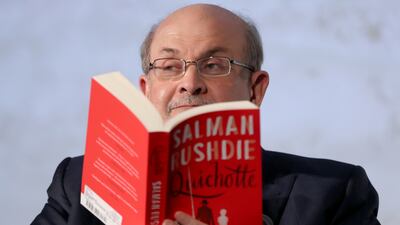Sir Salman Rushdie, the author stabbed on stage in New York on Friday, is a writer whose work which regularly touches on religion has made him a sometime controversial figure.
He was forced into hiding after the publication in 1988 of The Satanic Verses — which angered many Muslims — and has since become a champion of free speech in the West.
Scenes in the book have a character said to be modelled on the Prophet Mohammed.
Protests from Muslims, who considered the writing blasphemous, spread from the UK to Pakistan and Iran at its time of publication. Iran's former supreme leader, Ayatollah Ruhollah Khomeini, condemned the book and issued a fatwa against Rushdie. A bounty was also offered for his assassination.
For years, the author lived in hiding but eventually moved back into public life and became a force promoting freedom of speech.
Rushdie moved to the US in 2000 and was named a distinguished writer in residence at New York University in 2015.
On Friday, he had been preparing to speak on how the US acts as an asylum for writers and other artists in exile, according to the event programme.
Rushdie was born in India in 1947 into a Kashmiri Muslim family and moved to the UK to attend university.
Before writing books, he worked in advertising, dreaming up the ‘That’ll do nicely’ slogan for American Express’ and the ‘Naughty but nice’ campaign for cream cakes.
His first novel, Grimus, was published in 1975 and was followed by Midnight's Children in 1981. Midnight's Children, which won the Booker Prize, focuses on the events surrounding India's transition from British rule to independence and partition.
His third novel Shame in 1983 was followed by The Satanic Verses five years later, which changed his life and made him a public figure.
He was granted police protection by the government in Britain. He spent nearly a decade in hiding, moving houses repeatedly and being unable to tell his children where he lived.
Rushdie only began to emerge from his life on the run in the late 1990s, after Iran in 1998 said it would not support his assassination.
He became a fixture on the Western party circuit, even appearing in films such as Bridget Jones's Diary and US sitcom Seinfeld. He has been married four times and has two children.
As an advocate of freedom of speech, he notably launched a strong defence of French satirical magazine Charlie Hebdo, after staff were gunned down in Paris in 2015.
The magazine had published offensive drawings that drew furious reactions from Muslims worldwide.
“I stand with Charlie Hebdo, as we all must, to defend the art of satire, which has always been a force for liberty and against tyranny, dishonesty and stupidity,” he said.
Threats and boycotts have continued against literary events that Rushdie attends, and his knighthood in 2007 sparked protests in Iran and Pakistan.
The fatwa failed to stifle Rushdie's writing, however, and inspired his memoir Joseph Anton, named after his alias while in hiding and written in the third person.
It is one of several works of non-fiction and more than a dozen novels that Rushdie has written, along with several short stories, many of them addressing issues of migration and post-colonialism.
Still prolific, his latest novel Quichotte was published in 2019.
He was knighted in the UK for services to literature, received the Commandeur de l'Ordre des Arts et des Lettres in France and multiple awards in Europe and the United States.











